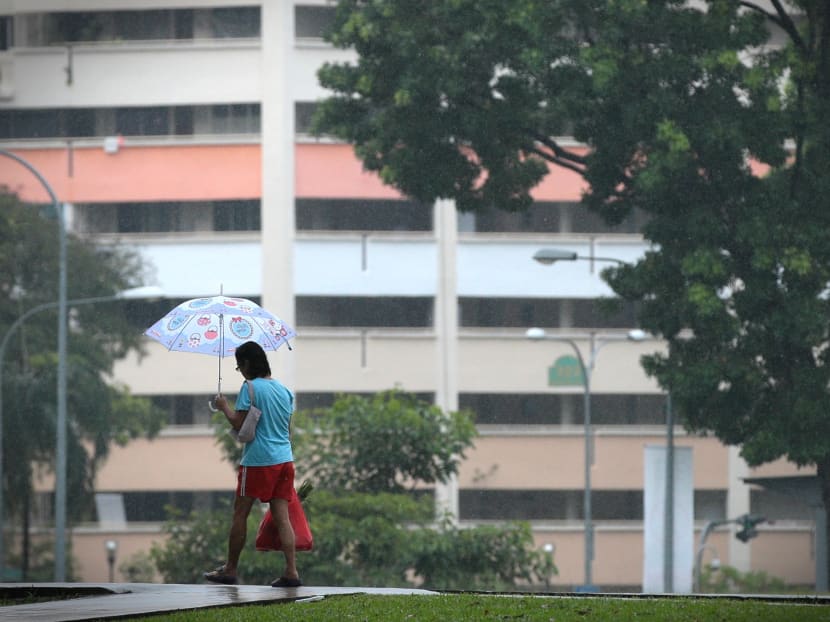Wet start to New Year continues as mercury drops to 21.1°C
SINGAPORE — Temperatures fell to a low of 21.1°C on Saturday (Jan 2) as cool and rainy weather from a monsoon surge continued from Friday, the National Environment Agency (NEA) said.
- Temperatures sank to 21.1°C at Newton on Saturday afternoon
- The highest total rainfall recorded was 210.6mm at Changi
- Thundery showers are expected on Sunday afternoon
SINGAPORE — Temperatures fell to a low of 21.1°C on Saturday (Jan 2) as cool and rainy weather from a monsoon surge continued from Friday, the National Environment Agency (NEA) said.
In a Facebook post, NEA said widespread continuous rain and some thundery showers were expected on Saturday before easing at night.
Similar conditions are forecast for the next few days.
As of 7pm on Saturday, the highest total rainfall recorded was 210.6mm at Changi.
"This exceeds the second-highest-ever recorded daily rainfall of 194.4mm for January at the Changi climate station," said NEA. The record high for January is 216.2mm.
The mercury dropped to a low of 21.1°C at Newton in the afternoon, the agency said in an update. This was revised downwards from 21.3°C earlier in the day.
On New Year's Day, Simei recorded the most rainfall at 147.3mm, while the lowest temperature was 21.2°C, also at Newton.
"This is the first monsoon surge occurrence in the current northeast monsoon season," NEA said. This refers to a strengthening of winds over the South China Sea, causing extensive rainclouds to form over the surrounding region.
Typically, there are two or three surge occurrences during the season, NEA said.
Dr Matthias Roth, professor of urban climatology at the National University of Singapore, said: "The relatively low temperatures experienced at present are primarily due to the cool air masses associated with the monsoon surges."
Another factor is reduced incoming solar radiation as sustained and extensive cloud cover prevents the sun from heating the air near the ground.
Even so, the prolonged rain spells should disappear once the dry phase arrives in February, Dr Roth added.
"Weak La Nina conditions are predicted to last until May and may result in slightly above-average rainfall," he said. The La Nina phenomenon is typically associated with greater rainfall.
"Thereafter, conditions should return to normal for the rest of the year."
In the last two days, national water agency PUB has issued flood-risk warnings for several places, including Lorong Halus, Pasir Ris Farmway 3, Jalan Seaview, Mountbatten Road and the junction of Bedok Road and Upper Changi Road East. This was after heavy rain caused water levels in the drains and canals to exceed 90 per cent capacity.
Based on a weather advisory from the Meteorological Service Singapore on Thursday, moderate thundery showers and windy conditions are expected in the first two weeks of the year.
Professor Benjamin Horton, director of the Earth Observatory of Singapore at the Nanyang Technological University, said that the unusually cooler conditions could be attributed to both man-made climate change and a natural "stretch of bad luck".
"Predicted climate change will significantly increase water-related risks, especially increasingly frequent and intense extreme rainfall events," he said.
"The earth is getting warmer, with significantly more moisture in the atmosphere. As the atmosphere gets warmer, it can hold more moisture. The intensity of downpours (and therefore the risk of floods) depends, in part, on how much water the air can hold at a given time."
The highest recorded daily total rainfall and lowest recorded temperature for the month of January in the past decade was 238.2mm at Pulau Ubin on Jan 30, 2011 and 20.1°C at Tengah on Jan 31, 2014.
For Sunday, NEA said it is expected to be cloudy in the morning, with thundery showers in the afternoon, with temperatures ranging between 22°C and 31°C. CNA
For more stories like this, visit cna.asia







